Editor’s Note: This is the fifth chapter of Romulus, by Jacob Abbott (published 1902).
V. The Flight of Æneas
Æneas, from his station upon the battlements of a neighboring edifice, witnessed the taking of the palace and the death of Priam. He immediately gave up all for lost, and turned his thoughts at once to the sole question of the means of saving himself and his family from impending destruction. He thought of his father, Anchises, who at this time lived with him in the city, and was nearly of the same age as Priam the king, whom he had just seen so cruelly slain. He thought of his wife too, whom he had left at home, and of his little son Ascanius, and he began now to be overwhelmed with the apprehension, that the besiegers had found their way to his dwelling, and were, perhaps, at that very moment plundering and destroying it and perpetrating cruel deeds of violence and outrage upon his wife and family. He determined immediately to hasten home.
He looked around to see who of his companions remained with him. There was not one. They had all gone and left him alone. Some had leaped down from the battlements and made their escape to other parts of the city. Some had fallen in the attempt to leap, and had perished in the flames that were burning among the buildings beneath them. Others still had been reached by darts and arrows from below, and had tumbled headlong from their lofty height into the street beneath them. The Greeks, too, had left that part of the city. When the destruction of the palace had been effected, there was no longer any motive to remain, and they had gone away, one band after another, with loud shouts of exultation and defiance, to seek new combats in other quarters of the city. Æneas listened to the sounds of their voices, as they gradually died away upon his ear. Thus, in one way and another, all had gone, and Æneas found himself alone.
Æneas contrived to find his way back safely to the street, and then stealthily choosing his way, and vigilantly watching against the dangers that surrounded him, he advanced cautiously among the ruins of the palace, in the direction toward his own home. He had not proceeded far before he saw a female figure lurking in the shadow of an altar near which he had to pass. It proved to be the princess Helen.
Helen was a Grecian princess, formerly the wife of Menelaus, king of Sparta, but she had eloped from Greece some years before, with Paris, the son of Priam, king of Troy, and this elopement had been the whole cause of the Trojan war. In the first instance, Menelaus, accompanied by another Grecian chieftain, went to Troy and demanded that Helen should be given up again to her proper husband. Paris refused to surrender her. Menelaus then returned to Greece and organized a grand expedition to proceed to Troy and recapture the queen. This was the origin of the war. The people, therefore, looked upon Helen as the cause, whether innocent or guilty, of all their calamities.
When Æneas, therefore, who was, as may well be supposed, in no very amiable or gentle temper, as he hurried along away from the smoking ruins of the palace toward his home, saw Helen endeavoring to screen herself from the destruction which she had been the means of bringing upon all that he held dear, he was aroused to a frenzy of anger against her, and determined to avenge the wrongs of his country by her destruction. “I will kill her,” said he to himself, as he rushed forward toward the spot where she was concealed. “There is no great glory it is true in wreaking vengeance on a woman, or in bringing her to the punishment which her crimes deserve. Still I will kill her, and I shall be commended for the deed. She shall not, after bringing ruin upon us, escape herself, and go back to Greece in safety and be a queen there again.”
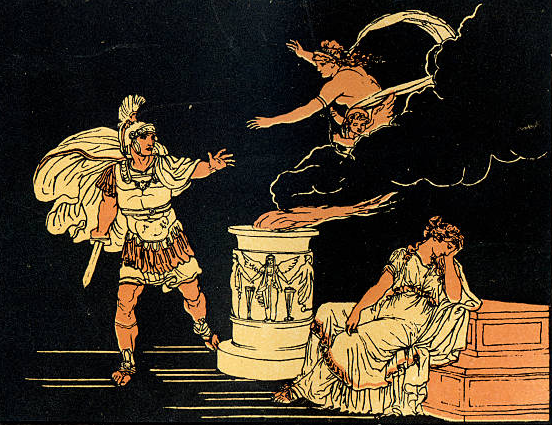
Æneas said these words, rushing forward at the same time, sword in hand, he was suddenly intercepted and brought to a stand by the apparition of his mother, the goddess Aphrodite, who all at once stood in the way before him. She stopped him, took him by the hand, urged him to restrain his useless anger, and calmed and quieted him with soothing words. “It is not Helen,” said she, “that has caused the destruction of Troy. It is through the irresistible and irrevocable decrees of the gods that the city has fallen. It is useless for you to struggle against inevitable destiny, or to attempt to take vengeance on mere human means and instrumentalities. Think no more of Helen. Think of your family. Your aged father, your helpless wife, your little son,—where are they? Even now while you are wasting time here in vain attempts to take vengeance on Helen for what the gods have done, all that are near and dear to you are surrounded by ferocious enemies thirsting for their blood. Fly to them and save them. I shall accompany you, though unseen, and will protect you and them from every impending danger.”
As soon as Aphrodite had spoken these words she disappeared from view. Æneas, following her injunctions, went directly toward his home; and he found as he passed along the streets that the way was opened for him, by mysterious movements among the armed bands which were passing in every direction about the city, in such a manner as to convince him that his mother was really accompanying him, and protecting his way by her supernatural powers.
When he reached home the first person whom he saw was Anchises his father. He told Anchises that all was lost, and that nothing now remained for them but to seek safety for themselves by flying to the mountains behind the city. But Anchises refused to go. “You who are young,” said he, “and who have enough of life before you to be worth preserving, may fly. As for me I will not attempt to save the little remnant that remains to me, to be spent, if saved, in miserable exile. If the powers of heaven had intended that I should have lived any longer, they would have spared my native city,—my only home. You may go yourselves, but leave me here to die.”
In saying these words Anchises turned away in great despondency, firmly fixed, apparently, in his determination to remain and share the fate of the city. Æneas and Creusa his wife joined their entreaties in urging him to go away. But he would not be persuaded. Æneas then declared that he would not go and leave his father. If one was to die they would all die, he said, together. He called for his armor and began to put it on, resolving to go out again into the streets of the city and die, since he must die, in the act of destroying his destroyers.
He was, however, prevented from carrying this determination into effect, by Creusa’s intervention, who fell down before him at the threshold of the door, almost frantic with excitement and terror, and holding her little son Ascanius with one arm, and clasping her husband’s knees with the other, she begged him not to leave them. “Stay and save us,” said she; “do not go and throw your life away. Or, if you will go, take us with you that we may all die together.”
The conflict of impulses and passions in this unhappy family continued for some time longer, but it ended at last in the yielding of Anchises to the wishes of the rest, and they all resolved to fly. In the mean time, the noise and uproar in the streets of the city, were drawing nearer and nearer, and the light of the burning buildings breaking out continually at new points in the progress of the conflagration, indicated that no time was to be lost. Æneas hastily formed his plan. His father was too old and infirm to go himself through the city. Æneas determined therefore to carry him upon his shoulders. Little Ascanius was to walk along by his side. Creusa was to follow, keeping as close as possible to her husband lest she should lose him in the darkness of the night, or in the scenes of uproar and confusion through which they would have to pass on the way. The domestics of the family were to escape from the city by different routes, each choosing his own, in order to avoid attracting the attention of their enemies; and when once without the gates they were all to rendezvous again at a certain rising ground, not far from the city, which Æneas designated to them by means of an old deserted temple which marked the spot, and a venerable cypress which grew there.
This plan being formed the party immediately proceeded to put it in execution. Æneas spread a lion’s skin over his shoulders to make the resting-place more easy for his father, or perhaps to lighten the pressure of the heavy burden upon his own limbs. Anchises took what were called the household gods, in his hands. These were sacred images which it was customary to keep, in those days, in every dwelling, as the symbol and embodiment of divine protection. To save these images, when every thing else was given up for lost, was always the object of the last desperate effort of the husband and father. Æneas in this case asked his father to take these images, as it would have been an impiety for him, having come fresh from scenes of battle and bloodshed, to have put his hand upon them, without previously performing some ceremony of purification. Ascanius took hold of his father’s hand. Creusa followed behind. Thus arranged they sallied forth from the house into the streets—all dark and gloomy, except so far as they received a partial and inconstant light from the flames of the distant conflagrations, which glared in the sky, and flashed sometimes upon battlements and towers, and upon the tops of lofty dwellings.
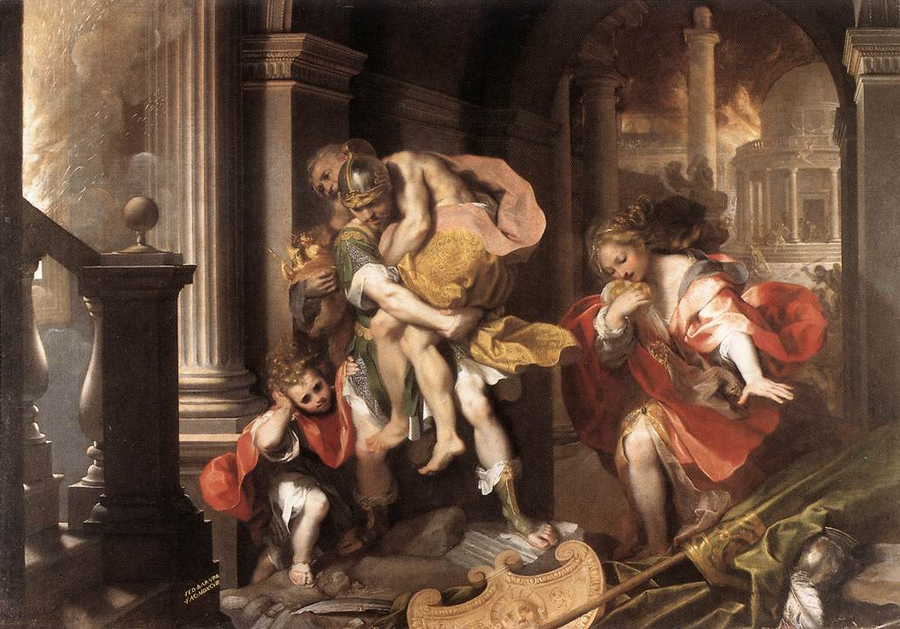
Æneas pressed steadily on, though in a state continually of the highest excitement and apprehension. He kept stealthily along wherever he could find the deepest shadows, under walls, and through the most obscure and the narrowest streets. He was in constant fear lest some stray dart or arrow should strike Anchises or Creusa, or lest some band of Greeks should come suddenly upon them, in which case he knew well that they would all be cut down without mercy, for, loaded down as he was with his burden, he would be entirely unable to do any thing to defend either himself or them. The party, however, for a time seemed to escape all these dangers, but at length, just as they were approaching the gate of the city, and began to think that they were safe, they were suddenly alarmed by a loud uproar, and by a rush of men which came in toward them from some streets in that quarter of the city, and threatened to overwhelm them. Anchises was greatly alarmed. He saw the gleaming weapons of the Greeks who were rushing toward them, and he called out to Æneas to fly faster, or to turn off some other way, in order to escape the impending danger. Æneas was terrified by the shouts and uproar which he heard, and his mind was for a moment confused by the bewildering influences of the scene. He however hurried forward, running this way and that, wherever there seemed the best prospect of escape, and often embarrassed and retarded in his flight by the crowds of people who were moving confusedly in all directions. At length, however, he succeeded in finding egress from the city. He pressed on, without stopping to look behind him till he reached the appointed place of rendezvous on the hill, and then gently laying down his burden, he looked around for Creusa. She was nowhere to be seen.
Æneas was in utter consternation, at finding that his wife was gone. He mourned and lamented this dreadful calamity with loud exclamations of grief and despair; then reflecting that it was a time for action and not for idle grief, he hastened to conceal his father and Ascanius in a dark and winding valley behind the hill, and leaving them there under the charge of his domestics, he hastened back to the city to see if Creusa could be found.
He armed himself completely before he went, being in his desperation determined to encounter every danger in his attempts to find and to recover his beloved wife. He went directly to the gate from which he had come out, and re-entering the city there, he began to retrace, as well as he could, the way that he had taken in coming out of the city—guiding himself as he went, by the light of the flames which rose up here and there from the burning buildings.
He went on in this way in a desperate state of agitation and distress, searching everywhere but seeing nothing of Creusa. At length he thought it possible that she had concluded, when she found herself separated from him, to go back to the house, as the safest place of refuge for her, and he determined, accordingly, to go and seek her there. This was his last hope, and most cruelly was it disappointed when he came to the place of his dwelling.
He found his house, when he arrived near the spot, all in flames. The surrounding buildings were burning too, and the streets in the neighborhood were piled up with furniture and goods which the wretched inmates of the dwellings had vainly endeavored to save. These inmates themselves were standing around, distracted with grief and terror, and gazing hopelessly upon the scene of devastation before them.
Æneas saw all these things at a glance, and immediately, in a frenzy of excitement, began to call out Creusa’s name. He went to and fro among the groups surrounding the fire, calling for her in a frantic manner, and imploring all whom he saw to give him some tidings of her. All was, however, in vain. She could not be found. Æneas then went roaming about through other portions of the city, seeking her everywhere, and inquiring for her of every person whom he met that had the appearance of being a friend. His suspense, however, was terminated at last by his suddenly coming upon an apparition of the spirit of Creusa, which rose before him in a solitary part of the city, and arrested his progress. The apparition was of preternatural size, and it stood before him in so ethereal and shadow-like a form, and the features beamed upon him with so calm and placid and benignant an expression, as convinced him that the vision was not of this world. Æneas saw at a glance that Creusa’s earthly sorrows and sufferings were ended forever.
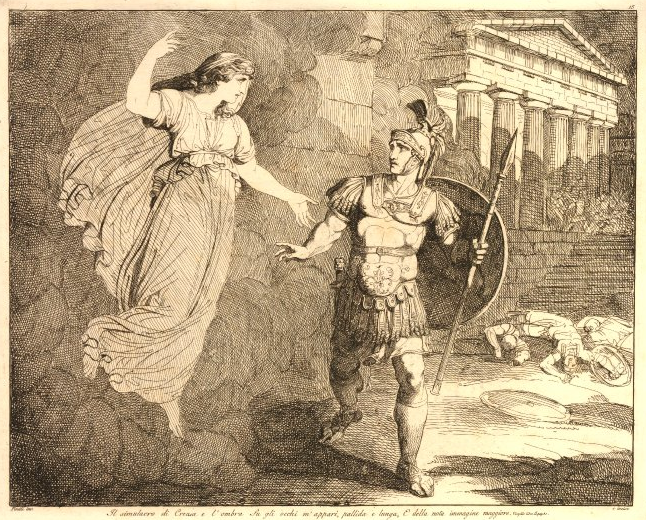
At first he was shocked and terrified at the spectacle. Creusa, however, endeavored to calm and quiet him by soothing words. “My dearest husband,” said she, “do not give way thus to anxiety and grief. The events which have befallen us, have not come by chance. They are all ordered by an overruling providence that is omnipotent and divine. It was predetermined by the decrees of heaven that you were not to take me with you in your flight. I have learned what your future destiny is to be. There is a long period of weary wandering before you, over the ocean and on the land, and you will have many difficulties, dangers, and trials to incur. You will, however, be conducted safely through them all, and will in the end find a peaceful and happy home on the banks of the Tiber. There you will found a new kingdom; a princess is even now provided for you there, to become your bride. Cease then to mourn for me; rather rejoice that I did not fall a captive into the hands of our enemies, to be carried away into Greece and made a slave. I am free, and you must not lament my fate. Farewell. Love Ascanius for my sake, and watch over him and protect him as long as you live.”
Having spoken these words, the vision began to disappear. Æneas endeavored to clasp the beloved image in his arms to retain it, but it was intangible and evanescent, and, before he could speak to it, it was gone, and he was left standing in the desolate and gloomy street alone. He turned at length slowly away; and solitary, thoughtful and sad, he went back to the gate of the city, and thence out to the valley where he had concealed Anchises and his little son.
He found them safe. The whole party then sought places of retreat among the glens and mountains, where they could remain concealed a few days, while Æneas and his companions could make arrangements for abandoning the country altogether. These arrangements were soon completed. As soon as the Greeks had retired, so that they could come out without danger from their place of retreat, Æneas employed his men in building a number of small vessels, fitting them, as was usual in those days, both with sails and oars.
During the progress of these preparations, small parties of Trojans were coming in continually, day by day, to join him; being drawn successively from their hiding-places among the mountains, by hearing that the Greeks had gone away, and that Æneas was gradually assembling the remnant of the Trojans on the shore. The numbers thus collected at Æneas’s encampment gradually increased, and as Æneas enlarged and extended his naval preparations to correspond with the augmenting numbers of his adherents, he found when he was ready to set sail, that he was at the head of a very respectable naval and military force.
When the fleet at last was ready, he put a stock of provisions on board, and embarked his men,—taking, of course, Anchises and Ascanius with him. As soon as a favorable wind arose, the expedition set sail. As the vessels moved slowly away, the decks were covered with men and women, who gazed mournfully at the receding shores, conscious that they were bidding a final farewell to their native land.
The nearest country within reach in leaving the Trojan coast, was Thrace—a country lying north of the Ægean Sea, and of the Propontis, being separated, in fact, in one part, from the Trojan territories, only by the Hellespont. Æneas turned his course northward toward this country, and, after a short voyage, landed there, and attempted to make a settlement. He was, however, prevented from remaining long, by a dreadful prodigy which he witnessed there, and which induced him to leave those shores very precipitously. The prodigy was this:
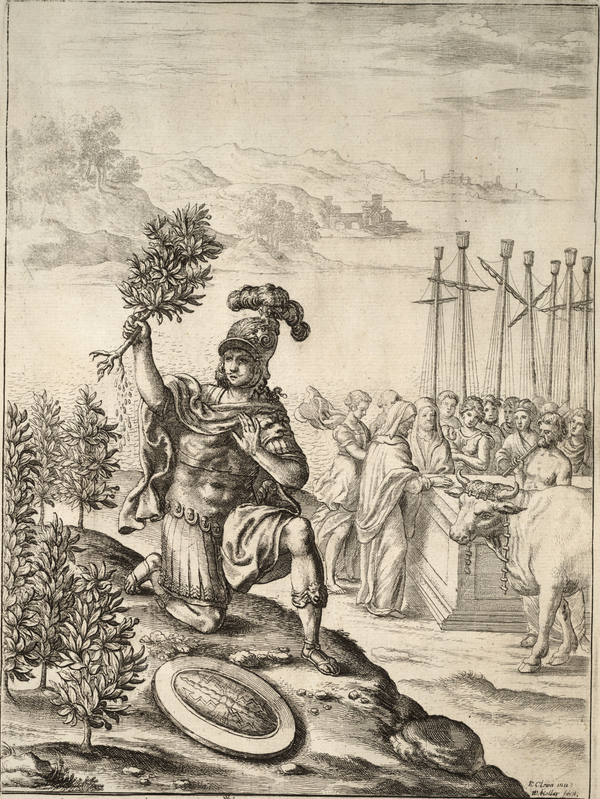
They had erected an altar on the shore, after they had landed, and were preparing to offer the sacrifices customary on such occasions, when Æneas, wishing to shade the altar with boughs, went to a myrtle bush which was growing near, and began to pull up the green shoots from the ground. To his astonishment and horror, he found that blood flowed from the roots whenever they were broken. Drops of what appeared to be human blood would ooze from the ruptured part as he held the shoot in his hand, and fall slowly to the ground. He was greatly terrified at this spectacle, considering it as some omen of very dreadful import. He immediately and instinctively offered up a prayer to the presiding deities of the land, that they would avert from him the evil influences, whatever they might be, which the omen seemed to portend, or that they would at least explain the meaning of the prodigy. After offering this prayer, he took hold of another stem of the myrtle, and attempted to draw it from the ground, in order to see whether any change in the appearances exhibited by the prodigy had been effected by his prayer. At the instant, however, when the roots began to give way, he heard a groan coming up from the ground below, as if from a person in suffering. Immediately afterward a voice, in a mournful and sepulchral accent, began to beg him to go away, and cease disturbing the repose of the dead. “What you are tearing and lacerating,” said the voice, “is not a tree, but a man. I am Polydorus. I was killed by the king of Thrace, and instead of burial, have been turned into a myrtle growing on the shore.”
Polydorus was a Trojan prince. He was the youngest son of Priam, and had been sent some years before to Thrace, to be brought up in the court of the Thracian king. He had been provided with a large supply of money and treasure when he left Troy, in order that all his wants might be abundantly supplied, and that he might maintain, during his absence from home, the position to which the rank as a Trojan prince entitled him. His treasures, however, which had been provided for him by his father as his sure reliance for support and protection, became the occasion of his ruin—for the Thracian king, when he found that the war was going against the Trojans, and that Priam the father was slain, and the city destroyed, murdered the helpless son to get possession of his gold.
Æneas and his companions were shocked to hear this story, and perceived at once that Thrace was no place of safety for them. They resolved immediately to leave the coast and seek their fortunes in other regions. They however, first, in secrecy and silence, but with great solemnity, performed those funeral rites for Polydorus which were considered in those ages essential to the repose of the dead. When these mournful ceremonies were ended they embarked on board their ships again and sailed away.
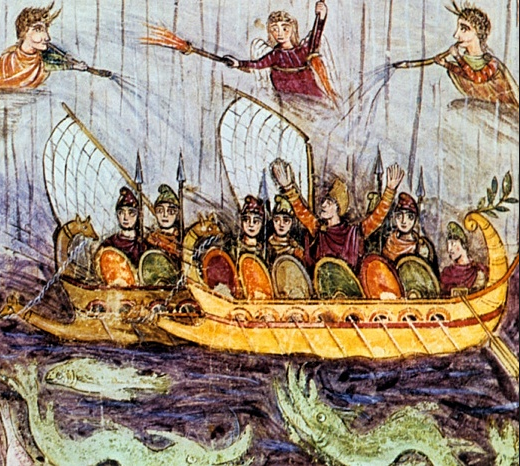
After this, the party of Æneas spent many months in weary voyages from island to island, and from shore to shore, along the Mediterranean sea, encountering every imaginable difficulty and danger, and meeting continually with the strangest and most romantic adventures. At one time they were misled by a mistaken interpretation of prophecy to attempt a settlement in Crete—a green and beautiful island lying south of the Ægean sea. They had applied to a sacred oracle, which had its seat at a certain consecrated spot which they visited in the course of their progress southward through the Ægean sea, asking the oracle to direct them where to go in order to find a settled home. The oracle, in answer to their request, informed them that they were to go to the land that their ancestors had originally come from, before their settlement in Troy. Æneas applied to Anchises to inform them what land this was. Anchises replied, that he thought it was Crete. There was an ancient tradition, he said, that some distinguished men among the ancestors of the Trojans had originated in Crete; and he presumed accordingly that that was the land to which the oracle referred.
The course of the little fleet was accordingly directed southward, and in due time the expedition safely reached the island of Crete, and landed there. They immediately commenced the work of effecting a settlement. They drew the ships up upon the shore; they laid out a city; they inclosed and planted fields, and began to build their houses. In a short time, however, all their bright prospects of rest and security were blighted by the breaking out of a dreadful pestilence among them. Many died; others who still lived, were utterly prostrated by the effects of the disease, and crawled about, emaciated and wretched, a miserable and piteous spectacle to behold. To crown their misfortunes, a great drought came on. The grain which they had planted was dried up and killed in the fields; and thus, in addition to the horrors of pestilence, they were threatened with the still greater horrors of famine. Their distress was extreme, and they were utterly at a loss to know what to do.
In this extremity Anchises recommended that they should send back to the oracle to inquire more particularly in respect to the meaning of the former response, in order to ascertain whether they had, by possibility, misinterpreted it, and made their settlement on the wrong ground. Or, if this was not the case, to learn by what other error or fault they had displeased the celestial powers, and brought upon themselves such terrible judgments. Æneas determined to adopt this advice, but he was prevented from carrying his intentions into effect by the following occurrence.
One night he was lying upon his couch in his dwelling,—so harassed by his anxieties and cares that he could not sleep, and revolving in his mind all possible plans for extricating himself and his followers from the difficulties which environed them. The moon shone in at the windows, and by the light of this luminary he saw, reposing in their shrines in the opposite side of the apartment where he was sleeping, the household images which he had rescued from the flames of Troy. As he looked upon these divinities in the still and solemn hour of midnight, oppressed with anxiety and care, one of them began to address him.
“We are commissioned,” said this supernatural voice, “by Apollo, whose oracle you are intending to consult again, to give you the answer that you desire, without requiring you to go back to his temple. It is true that you have erred in attempting to make a settlement in Crete. This is not the land which is destined to be your home. You must leave these shores, and continue your voyage. The land which is destined to receive you is Italy, a land far removed from this spot, and your way to it lies over wide and boisterous seas. Do not be discouraged, however, on this account, or on account of the calamities which now impend over you. You will be prospered in the end. You will reach Italy in safety, and there you will lay the foundations of a mighty empire, which in days to come will extend its dominion far and wide among the nations of the earth. Take courage, then, and embark once more in your ships with a cheerful and confident heart. You are safe, and in the end all will turn out well.”
The strength and spirits of the desponding adventurer were very essentially revived by this encouragement. He immediately prepared to obey the injunctions which had been thus divinely communicated to him, and in a short time the half-built city was abandoned, and the expedition once more embarked on board the fleet and proceeded to sea. They met in their subsequent wanderings with a great variety of adventures, but it would extend this portion of our narrative too far, to relate them all. They encountered a storm by which for three days and three nights they were tossed to and fro, without seeing sun or stars, and of course without any guidance whatever; and during all this time they were in the most imminent danger of being overwhelmed and destroyed by the billows which rolled sublimely and frightfully around them. At another time, having landed for rest and refreshment among a group of Grecian islands, they were attacked by the harpies, birds of prey of prodigious size and most offensive habits, and fierce and voracious beyond description. The harpies were celebrated, in fact, in many of the ancient tales, as a race of beings that infested certain shores, and often teased and tormented the mariners and adventurers that happened to come among them. Some said, however, that there was not a race of such beings, but only two or three in all, and they gave their names. And yet different narrators gave different names, among which were Aëlopos, Nicothoë, Ocythoë, Ocypoæ, Celæno, Acholoë, and Aëllo. Some said that the harpies had the faces and forms of women. Others described them as frightfully ugly; but all agree in representing them as voracious beyond description, always greedily devouring every thing that they could get within reach of their claws.
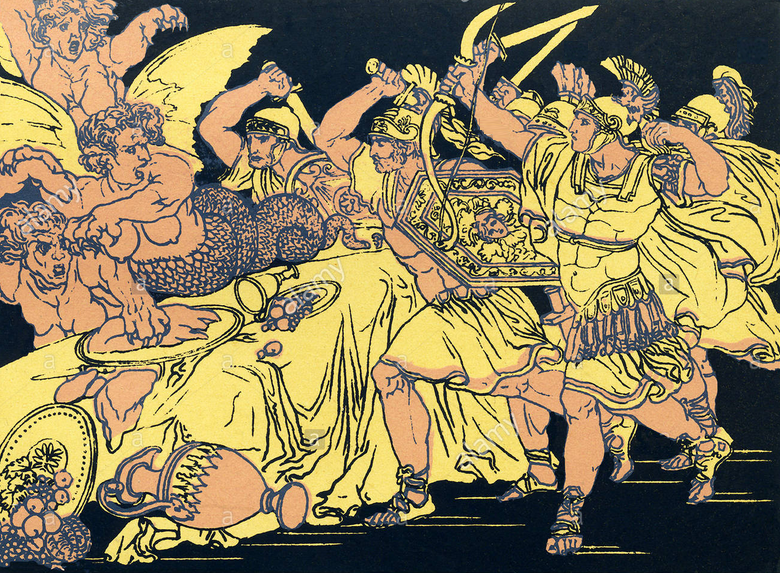
These fierce monsters flew down upon Æneas and his party, and carried away the food from off the table before them; and even attacked the men themselves. The men then armed themselves with swords, secretly, and waited for the next approach of the harpies, intending to kill them, when they came near. But the nimble marauders eluded all their blows, and escaped with their plunder as before. At length the expedition was driven away from the island altogether, by these ravenous fowls, and when they were embarking on board of their vessels, the leader of the harpies perched herself upon a rock overlooking the scene, and in a human voice loaded Æneas and his companions, as they went away, with taunts and execrations.

The expedition passed one night in great terror and dread in the vicinity of Mount Etna, where they had landed. The awful eruptions of smoke, and flame, and burning lava, which issued at midnight from the summit of the mountain,—the thundering sounds which they heard rolling beneath them, through the ground, and the dread which was inspired in their minds by the terrible monsters that dwelt beneath the mountains, as they supposed, and fed the fires, all combined to impress them with a sense of unutterable awe; and as soon as the light of the morning enabled them to resume their course, they made all haste to get away from so appalling a scene. At another time they touched upon a coast which was inhabited by a race of one-eyed giants,—monsters of enormous magnitude and of remorseless cruelty. They were cannibals,—feeding on the bodies of men whom they killed by grasping them in their hands and beating them against the rocks which formed the sides of their den. Some men whom one of these monsters, named Polyphemus, had shut up in his cavern, contrived to surprise their keeper in his sleep, and though they were wholly unable to kill him on account of his colossal magnitude, they succeeded in putting out his eye, and Æneas and his companions saw the blinded giant, as they passed along the coast, wading in the sea, and bathing his wound. He was guiding his footsteps as he walked, by means of the trunk of a tall pine which served him for a staff.
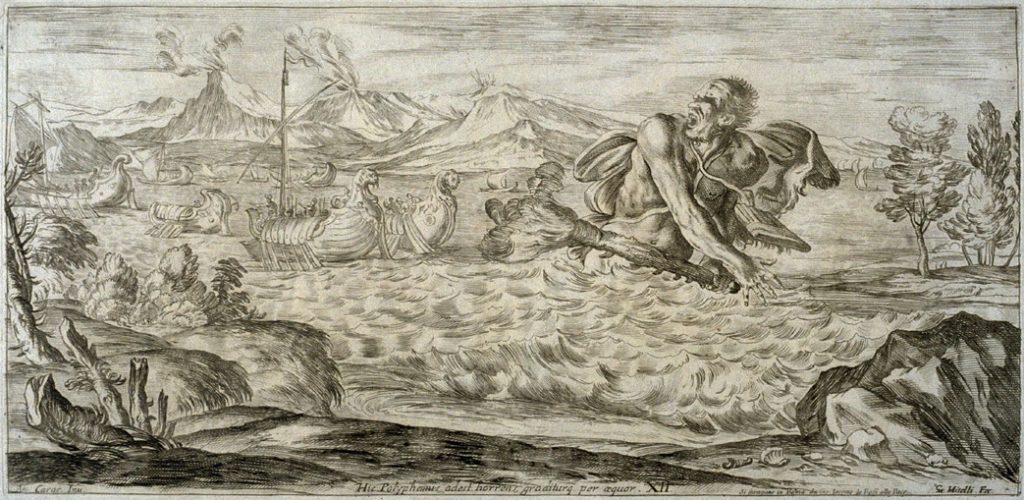
At length, however, after the lapse of a long period of time, and after meeting with a great variety of adventures to which we can not even here allude, Æneas and his party reached the shores of Italy, at the point which by divine intimations had been pointed out to them as the place where they were to land.
The story of the life and adventures of Æneas, which we have given in this and in the preceding chapters, is a faithful summary of the narrative which the poetic historians of those days recorded. It is, of course, not to be relied upon as a narrative of facts; but it is worthy of very special attention by every cultivated mind of the present day, from the fact, that such is the beauty, the grace, the melody, the inimitable poetic perfection with which the story is told, in the language in which the original record stands, that the narrative has made a more deep and widespread, and lasting impression upon the human mind than any other narrative perhaps that ever was penned.

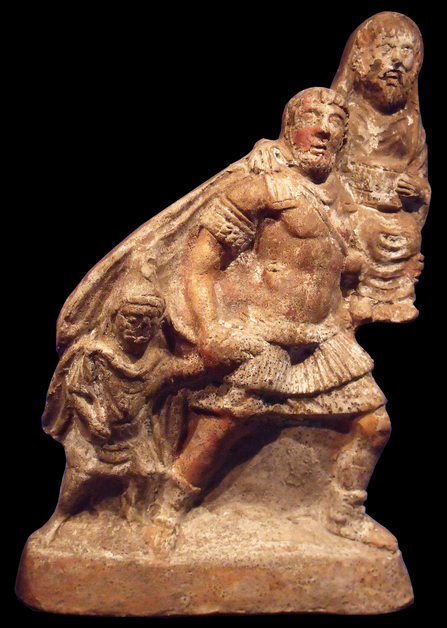








Interesting to see the legend of Odysseus echoed so clearly among the cyclopes.